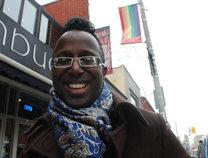To wrap up Black History Month, the stories and contributions of queer black leaders will be celebrated at a panel discussion on Feb 28 at Ryerson University.
Rinaldo Walcott, an associate professor at OISE/University of Toronto in the department of sociology and equity studies in education, says many people don’t realize queer black women helped organize the community to action in the early ’80s, adding a fierce and radical voice to the growing gay liberation movement on Toronto’s streets.
Walcott will be one of four esteemed speakers at Queering Black History Month, addressing the black queer experience and how the community shaped the global movement. The panel runs from 5:30pm to 8:30pm.
“If it wasn’t for black lesbians, in particular, who organized, especially in the late ’70s and throughout the ’80s, the black queer presence on our streets would have been entirely impoverished,” he says. “If those women didn’t come out, all the young black men that we see in the gay village now would have had a very different experience.”
Small writing circles, underground publications like Fifth Division Press, youth-led activist groups and other actions led by black women are often forgotten in place of the stories of white gay men, Walcott says.
“I think the stories got lost because we didn’t end up in any organization that became mainstreamed or institutionalized,” says Angela Robertson, director of equity and community engagement at Women’s College Hospital, Community Advisory Panel member and chair of Black CAP. She will moderate the discussion.
“Those histories are lost in mainstream archives. They are buried in the files and boxes in the homes of individual women who participated in those activities.”
Robertson served as managing editor of Women’s Educational Press in the late ’80s and early ’90s, giving queer women representation in the arts and in politics by publishing Canada’s first oral history of Chinese and African Canadian Women.
Robertson says much of the early organizing was black women fighting for issues of poverty, sexual identity, workers’ rights, racism and police violence, and education in schools.
“So many of those initiatives were led by queer women activists in the black communities here in the city,” she says. “We were women who were workers and activists in our work, and workplaces became sites of activism.”
Other panel members include Syrus Ware, program coordinator at the Art Gallery of Ontario; Courtnay McFarlane, manager of youth services at Davenport-Perth Community Health Centre; and Notisha Massaquoi, executive director of Women’s Health in Women’s Hands Community Health Centre.
“By naming people, events and actions of what black queers in the city have engaged in, putting them into the public record, demonstrates that black queers have always been a part of these conversations,” Walcott says. “We are not new to these conversations.
“I hope to send people away with a sense that we should be recovering those histories.”
Event organizer LaLi Mohamed says the goal is to reinsert the lives and achievements of queer and trans African and Caribbean people in Canada into the larger historical discussion.
“When we do talk about these histories, it’s always the men,” says Mohamed. “We so rarely talk about how feminism, black history, trans history and the gay liberation movement intersect.
“And that intersection is so beautiful. So I want to show the resiliency of these communities and how we mobilize together. I think that’s really amazing.”
Walcott says the people, publications and leaders who were at the beginnings of the movement need to be put on the public record. “That places value on people’s lives and celebrates them. We really need to affirm people’s experiences,” Mohamed adds.
“This summer is a great example of that. With Blockorama we had to do it ourselves.”
Along with the panel discussion, there will also be an exhibition of art from queer youth of colour.
“This is the first event of its kind at Ryerson University,” Mohamed says. “And this isn’t an event just for queer black youth. Everyone should know.”
Mohamed especially wants to see the audience packed with queer black youth. It’s no secret many queer youth grow up feeling isolated and alienated because they assume they’re alone in the world.
“The suicides of this past year prove that,” he says. “Hopefully they see, by learning about their vibrant history, that they are not alone. These aren’t just black queer stories. It’s all our stories.
“Queer black youth need to know there is a Village behind them. So hopefully the [Church and Wellesley] Village comes to this event and helps us celebrate our lives.”
For more information, contact organizers Rodney Diverlus at vp.equity@rsuonline.ca or Lali Mohamed, at lali.moham@gmail.com.

 Why you can trust Xtra
Why you can trust Xtra


